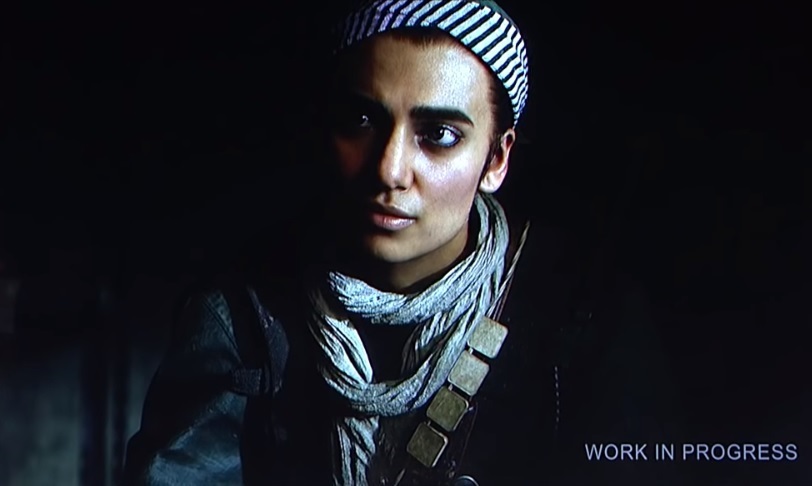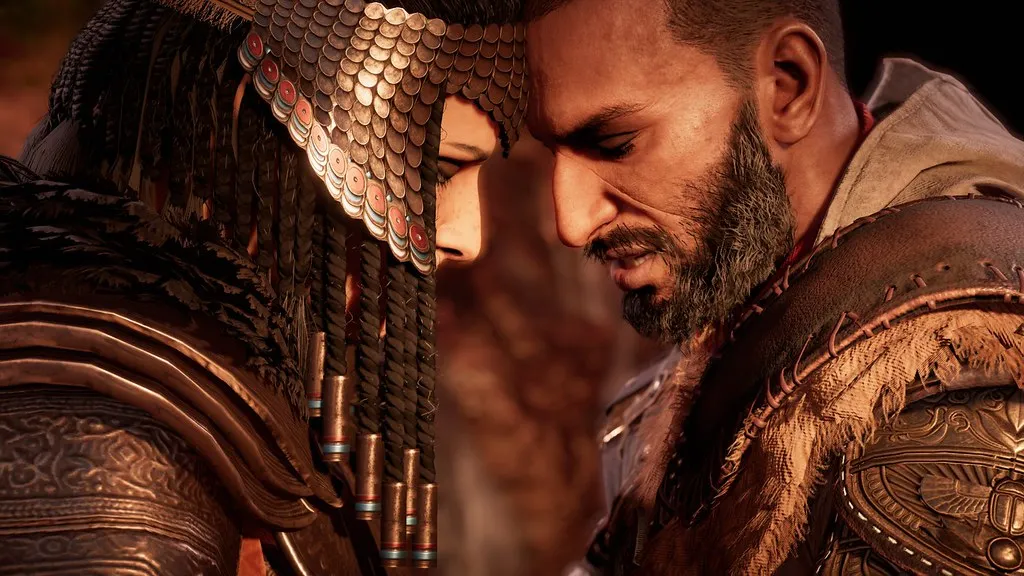Living in the West, most have seen the stereotypical portrayals of Arabs in media today: a dark cartoon character sporting a turban and wiry beard, a beady-eyed scimitar-wielding combatant, a terrorist with a rifle, or crazed mobs shouting illegible mush. Over the last few decades, movies and TV shows have routinely used Arabs for cannon fodder and cheap laughs.
The 2006 documentary Reel Bad Arabs (seen below) by Jack Shaheen and Jeremy Earp succinctly illustrates how Hollywood depicts and manipulates the image of Arabs. They analyzed 1,000 films produced between 1896 to 2000 that have Arab and Muslim characters and found an overwhelming majority of 936 were negative in their portrayal, while only 12 were positive.
The situation isn’t a whole lot better when you move to mainstream gaming. The number of positive Arab protagonists can be counted on a single hand, and the conversation around diversity and inclusion rarely encompasses Middle Easterners. Instead, characters of Middle Eastern origin are much more likely to be your enemy in games like Call of Duty, Battlefield, Full Spectrum Warrior, Delta Force, and Command & Conquer. Metal Gear Solid 4: Guns of the Patriots brought the Middle East into the fold with a classic portrayal of a dangerous war zone that’s dusty, sandy, and steeped in chaotic battles. Arabs were present only to serve as a backdrop for what they do best: holding a rifle and getting slaughtered by a technologically superior enemy.
Even games depicting Arab allies indirectly push more stereotypes. The Uncharted series is a critical and commercial darling and one of my favorite franchises. Uncharted 3: Drake’s Deception takes its hero Nathan Drake on a globe-trotting adventure across multiple nations, which includes visiting an ally named Salim. He’s portrayed as leading a group of Bedouins who inhabit the desert, clad in long “Arab” dress, serving tea against the backdrop of what appears to be an oasis surrounded by date trees.
It’s the standard representation of what the world perceives the Middle East to be. Faridah Malik in Deus Ex: Human Revolution is the game’s chief helicopter pilot, a strong-willed, intelligent woman and a practicing Muslim. While a very welcome positive portrayal of an Arab character, she’s made more relatable through Americanization and Westernization. We can empathize more with her because she’s one of the “good ones.”
Ubisoft has been one of the only companies making games with Middle Eastern leads, with characters such as Altair Ibn-La’Ahad and Bayek of Siwa becoming prominent figures in the Assassin’s Creed franchise. Altair becomes a legendary assassin and resists the corrupt Templars at every turn. Bayek loses his son at the onset of Assassin’s Creed: Origins and sets out for revenge alongside his wife, Aya.
They become one of the more authentic couples in the Assassin’s Creed universe. Love, loss, and the desire for peace and justice define their relationship in a very human way. Ubisoft also accurately represented Istanbul onscreen in Assassin’s Creed: Revelations, giving the city the beauty and grandeur it rightly deserves. A Middle Easterner is also the star of the company’s Prince of Persia franchise.

Farah Karim, freedom fighter leader in Call of Duty: Modern Warfare (2019)
The industry is working on presenting a fairer and more accurate image of Middle Eastern natives. While past Call of Duty titles were steeped in stereotypes, newer games feature distinguished Arab allies and even leads. Lieutenant Nora Salter is Lebanese and your prime ally and friend in Call of Duty: Infinite Warfare. She’s as dedicated to the cause as everyone else and loyal to you throughout the duration of the game.
Set to release on Oct. 25, Call of Duty: Modern Warfare will have players spend a significant portion of the game as freedom fighter Farah Karim as she defends her people and homeland from hostile forces. It remains to be seen whether developer Infinity Ward will delve deeply into the characters of Farah and her kin or become trapped in Middle Eastern tropes. I hold cautious optimism that the narrative team can show an honest and authentic side of that part of the world, and I’m eager to dive into the campaign.
The gains made possible by including Middle Eastern protagonists in games cannot be overstated. Empathy comes from putting ourselves in the shoes of another human being. This region has seen thousands of years of peace, conflict, stagnation, and growth. It has more than wartime stories to tell, and it is filled with more than horses, camels, and Bedouin tribes wandering desert dunes.
The region has packed cities, nightlife, ambitious entrepreneurs, and cab drivers who want to share their stories with their passengers. Restaurant owners and chefs collaborate on new recipes while teens play soccer in the streets. The Middle East is filled with people who yearn to be understood. They’re more than the battle-hungry goons we often see in media.
The Middle East is home to millions of gamers. It’s a huge market that continues to grow each year. While it would be natural to argue that the native population should create their own games if they want to see themselves onscreen, the region’s game development scene is still in its infancy in comparison to Japan or the West. While it plays catch-up, it’s up to companies with more resources and bigger audiences to fill the gap.

Middle East & Africa Game Revenue in 2017 – Courtesy of Newzoo
As an Arab American, I have been to the Middle East multiple times. Families wake up each day aspiring to improve their lives. Parents scramble to get their kids ready for school and get frustrated by rush hour traffic. Children grow up, make friends, form crushes, and fall in love.
We know games are fictional and created for entertainment, but their ideas and tropes about the Middle East continue to find a home in our collective conscience as impressions of real people, shaping our perception to be “that’s all there is.” The more we strive to show the human, ordinary side of the Middle East, the faster we can move past the corner it and its people are painted into. Game developers can help make that happen by giving players the chance to step into their lives.






Published: Aug 18, 2019 10:00 am